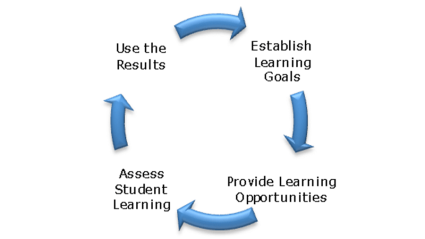Why do assessment?
To help students succeed and engage them in their own learning.
Assessment is the ongoing process of improving student learning by gathering evidence of what students are (and are not) learning-- and then changing instruction or curriculum based on our findings.

The steps to this circular process are the same whether we are collecting information to learn more about our students in each of our disciplines or going through an accreditation period.
The four step process is straightforward:
Step One. Clearly articulate our educational goals. What is the body of knowledge and skills that we want our students to learn in our courses, in our majors and minors, and collectively at Mount Holyoke?
Step Two. Provide learning opportunities that align with these goals.
Step Three. Identify and gather evidence to measure how our students are doing in terms of the educational goals. This evidence usually includes both direct (student papers, exams, portfolios, presentations, laboratory procedure, musical performance) and indirect (student surveys, self-reports, exit interviews). It is important that student performance is measured against a set of explicit criteria that are drawn from the department’s goals for student learning.
Step Four. Use this evidence to reflect on the findings and then make adjustments to our instruction or curriculum to improve our programs and our students’ success!
Why is it important?
Meaningful assessment is a faculty-led process of self-reflection that allows us to improve our academic program in a learner-centered and evidence-based way, drawing on the broader scholarship of teaching and learning, as well as evidence from our own campus. A more formal assessment process simply makes explicit the ongoing conversations we frequently have about our experiences teaching and our students learning here at MHC. In the end, the goal is to strengthen MHC’s tradition of rigorous intellectual engagement, creative collaboration, and inclusive student and faculty community.
Did someone say Assessment?
The term “assessment” and its related jargon are often associated with systems of corporate and government-mandated accountability, triggering negative associations and judgements. One national expert says “Assessment is the longest four-letter word.” Certainly, assessment can be done in ways that are problematic and do little to enhance intellectual life on a campus.
Yet, the negative association is not entirely fair. The effectiveness of classroom assessment as a practice that promotes student learning is strongly supported by current educational research. And by taking ownership of this process, faculty have an opportunity to shape it in ways that make reflect their own values
The difference between Assessment and Evaluation?
Assessment is interested in the quality of the future.
Assessment is an interactive process between students and faculty that informs faculty how well their students are learning what they are teaching. The information is then used by faculty to make changes in the learning environment, and is shared with students to assist them in improving their learning and study habits.
Evaluation is interested in the quality of the present.
Mid-Semester check-ins or evaluations (regardless of how informal) will tell us the current state of student learning.. Evaluation helps us decide if a standard was met, focuses on grades. It also includes discussion, participation, or attendance. Also, department can have a program embedded that they may evaluate but not assess, such as a peer mentor program.
Need help getting started?
Contact TLI to schedule an Assessment Consult


Explore the MHC Social Universe >